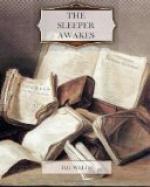“I was forty-three when his bankers—you remember you wired to his bankers—sent on to me.”
“I got their address from the cheque book in his pocket,” said Isbister.
“Well, the addition is not difficult,” said Warming.
There was another pause, and then Isbister gave way to an unavoidable curiosity. “He may go on for years yet,” he said, and had a moment of hesitation. “We have to consider that. His affairs, you know, may fall some day into the hands of—someone else, you know.”
“That, if you will believe me, Mr. Isbister, is one of the problems most constantly before my mind. We happen to be—as a matter of fact, there are no very trustworthy connexions of ours. It is a grotesque and unprecedented position.”
“Rather,” said Isbister.
“It seems to me it’s a case of some public body, some practically undying guardian. If he really is going on living—as the doctors, some of them, think. As a matter of fact, I have gone to one or two public men about it. But, so far, nothing has been done.”
“It wouldn’t be a bad idea to hand him over to some public body—the British Museum Trustees, or the Royal College of Physicians. Sounds a bit odd, of course, but the whole situation is odd.”
“The difficulty is to induce them to take him.”
“Red tape, I suppose?”
“Partly.”
Pause. “It’s a curious business, certainly,” said Isbister. “And compound interest has a way of mounting up.”
“It has,” said Warming. “And now the gold supplies are running short there is a tendency towards ... appreciation.”
“I’ve felt that,” said Isbister with a grimace. “But it makes it better for him.”
“If he wakes.”
“If he wakes,” echoed Isbister. “Do you notice the pinched-in look of his nose, and the way in which his eyelids sink?”
Warming looked and thought for a space. “I doubt if he will wake,” he said at last.
“I never properly understood,” said Isbister, “what it was brought this on. He told me something about overstudy. I’ve often been curious.”
“He was a man of considerable gifts, but spasmodic, emotional. He had grave domestic troubles, divorced his wife, in fact, and it was as a relief from that, I think, that he took up politics of the rabid sort. He was a fanatical Radical—a Socialist—or typical Liberal, as they used to call themselves, of the advanced school. Energetic—flighty—undisciplined. Overwork upon a controversy did this for him. I remember the pamphlet he wrote—a curious production. Wild, whirling stuff. There were one or two prophecies. Some of them are already exploded, some of them are established facts. But for the most part to read such a thesis is to realise how full the world is of unanticipated things. He will have much to learn, much to unlearn, when he wakes. If ever a waking comes.”
“I’d give anything to be there,” said Isbister, “just to hear what he would say to it all.”




